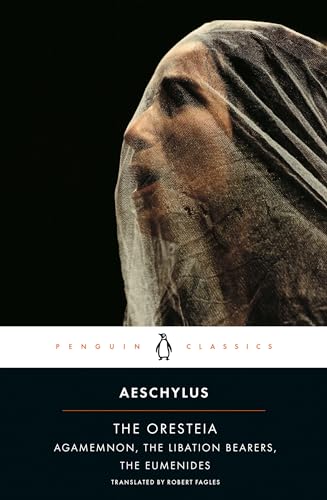The Oresteia
Agamemnon; The Libation Bearers; The Eumenides
Aeschylus
BOOK REVIEW

In the realm of ancient Greek tragedy, The Oresteia stands as a monumental cornerstone, dazzling both in its intelligent narrative and its emotionally charged themes. This trilogy, penned by the legendary playwright Aeschylus, unravels a tale drenched in blood, vengeance, and the haunting specter of familial duty. It's not just a series of plays; it's a testament to the human condition, a fight between old and new moral orders, and a chilling reminder of the past's grip on the present.
Spanning three profound acts-Agamemnon, The Libation Bearers, and The Eumenides-the narrative plunges into the heart of the House of Atreus. The haunting tones of betrayal and revenge echo through the halls of Agamemnon as he returns victorious from Troy, only to meet a fate meant for the treacherous. The shattering cry of his queen, Clytemnestra, is a tempest of emotion, as she wields a knife not just of steel, but of scorn and grief. Her act of vengeance ripples through the fabric of the family, compelling Orestes, their son, into a vendetta that is as much a burden as it is a duty.
As you delve into the intricate layers of The Oresteia, you find yourself wrestling with more than just the tragedies of its characters. Aeschylus forces you to confront the moral ambiguity of his world-should Orestes avenge his father, or does this cycle of violence only breed further violence? Are we destined to be slaves to our furies and obsessions, or can we carve a new path towards justice? This exploration of morality, retribution, and the dawn of law resonates powerfully in contemporary discussions about justice and ethics.
Many readers have noted that Aeschylus does not shy away from the stark, terrifying realities of human nature. One cannot read Clytemnestra's chilling determination without feeling the unsettling questions about loyalty, power, and the cost of vengeance needle at your conscience. Critics frequently debate Aeschylus's portrayal of women, with Clytemnestra viewed by some as a fierce embodiment of feminine power, and by others, as a cautionary tale of betrayal. The range of interpretations surrounding her character adds to the text's allure, showcasing Aeschylus's mastery in crafting figures who linger in the mind long after the final curtain falls.
The saga's crescendo arrives in The Eumenides, where the cycle of revenge is confronted by the establishment of order. Here, we see the transformation from primal, familial retribution to a structured legal system. It's as if Aeschylus is whispering across the ages: "What kind of society will emerge from the ashes of vengeance?" Readers are drawn into a whirlwind of excitement and trepidation as the fate of Orestes hangs in the balance during his trial. This fundamental shift not only intrigues but demands reflection-how do we achieve justice in a world fraught with chaos? Are our modern systems any less susceptible to the shadows that loom over our own decisions?
The echoes of The Oresteia resonate through time, inspiring vast thinkers like Nietzsche and Freud, and even bleeding into modern-day tragedies and legal dramas. The chills of its themes have seeped into our cultural fabric, influencing how we perceive justice and morality. The complexities of familial bonds and the repercussions of our choices are threads woven into the very tapestry of literature and philosophy.
In reading The Oresteia, you're not merely engaging with a classic; you are stepping into a world where every choice matters, and every action carries the weight of generations. It's an exhilarating confrontation with our past, an examination of our present, and a challenge for the future. The emotional intensity of Aeschylus's work compels you to examine your own lives, relationships, and moral stances-how often do we find ourselves in cycles of vengeance or conflict?
To deny yourself this experience would be a disservice not just to Aeschylus, but to your own understanding of the intricate dance between fate, choice, and consequence. Don't merely read The Oresteia; immerse yourself in its depths. It dares you to reflect on the very nature of justice, beckoning you to redefine what it means to be human amidst the cacophony of ancient and modern dilemmas alike. Embrace the tempestuous ride through vengeance, justice, and redemption, and you will emerge forever altered. 🌀
📖 The Oresteia: Agamemnon; The Libation Bearers; The Eumenides
✍ by Aeschylus
🧾 336 pages
1984
#oresteia #agamemnon #libation #bearers #eumenides #aeschylus #Aeschylus